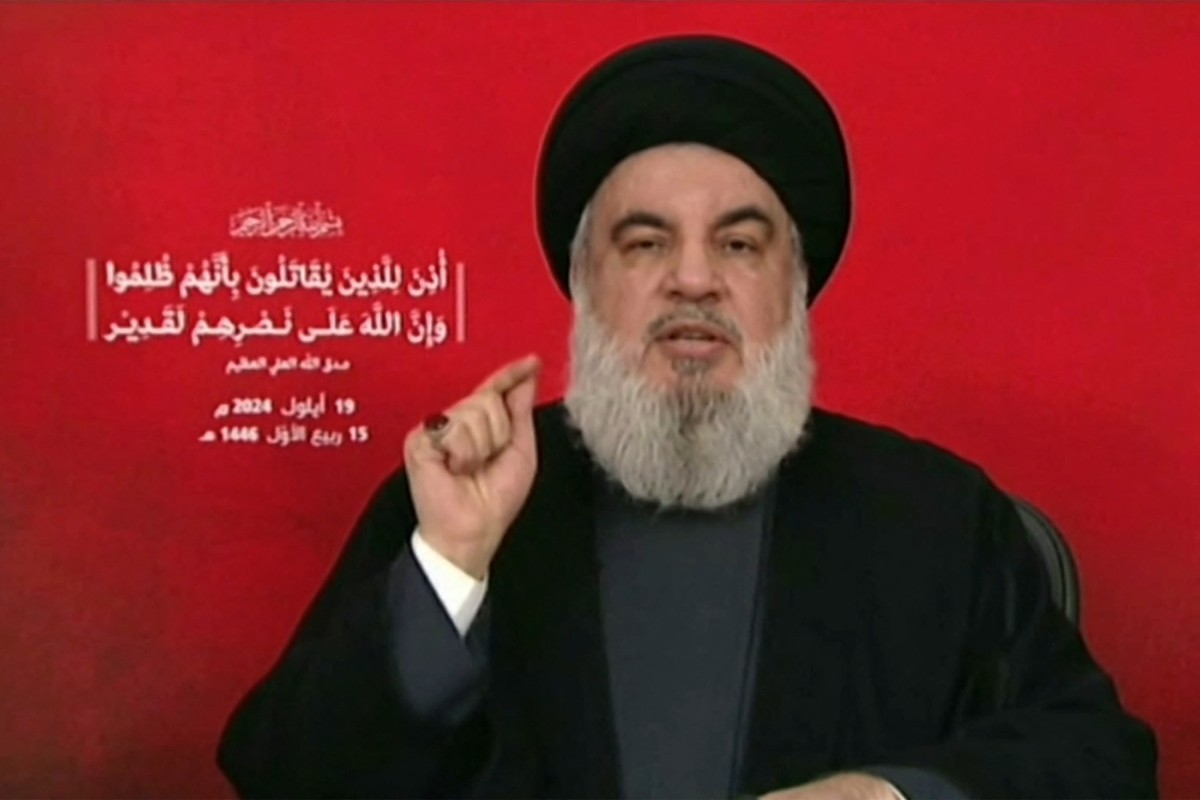Beirut, Lebanon – The leader of Hizbollah acknowledged on Thursday that his group had suffered an “unprecedented” blow when thousands of operatives’ communication devices exploded across Lebanon in deadly attacks it blamed on Israel.
In his first speech since the attacks, which killed 37 people and wounded nearly 3,000 across two days, Hassan Nasrallah struck a defiant tone, vowing that Israel would face retribution.
Even as he delivered his televised address, Israeli warplanes broke the sound barrier over Beirut.
Describing the attacks as a “massacre” and as a possible “act of war”, Nasrallah said Israel would face “tough retribution and a just punishment, where it expects it and where it does not”.
Israel has not commented on the attacks in which Hizbollah operatives’ pagers and walkie-talkies exploded in supermarkets, on streets and at funerals, plunging the country into panic.
But Defence Minister Yoav Gallant said on Wednesday, in reference to Israel’s border with Lebanon: “The centre of gravity is moving northward.”
“We are at the start of a new phase in the war,” he warned.
Iran-backed Hizbollah is an ally of Palestinian group Hamas, which has been fighting a war in Gaza since its October 7 attack on Israel.
For nearly a year, the focus of Israel’s firepower has been on Gaza, which is ruled by Hamas.
But its troops have also been engaged in near-daily clashes with Hizbollah fighters along its northern border, killing hundreds in Lebanon, most of them fighters, and dozens in Israel.
The exchanges of fire have forced tens of thousands of people on both sides of the border to flee their homes.
Nasrallah vowed to keep up Hizbollah’s fight against Israel until a ceasefire in Gaza is reached.
“The Lebanese front will not stop until the aggression on Gaza stops” despite “all this blood spilt,” he said.
Hamas welcomed the promise of continued support, saying it “serves as a blow to (Israeli prime Minister Benjamin) Netanyahu and his fascist government”.
Gallant vowed that Israel’s military actions against Hizbollah “will continue”.
“In the new phase of the war there are significant opportunities but also significant risks. Hizbollah feels persecuted. The sequence of our military actions will continue,” the minister said.
The Israeli military announced new strikes on Hizbollah targets in Lebanon on Thursday, as warning sirens rang out in northern Israel indicating possible incoming fire.
The Israeli military also said two soldiers were killed near the border.
Hizbollah said 25 of its members had been killed in the explosions, with a source close to the group saying at least 20 had died when their walkie-talkies blew up.
‘Wider war’
Lebanon’s Foreign Minister Abdallah Bou Habib said the “blatant assault on Lebanon’s sovereignty and security” was a dangerous development that could “signal a wider war”.
Prime Minister Najib Mikati urged the United Nations to oppose Israel’s “technological war” on the country, ahead of a UN Security Council meeting on the attacks set for Friday.
Iran’s Revolutionary Guards said Israel faces “a crushing response from the resistance front” after the blasts, which wounded Tehran’s ambassador in Beirut.
US Secretary of State Antony Blinken, who has been scrambling to salvage efforts for a Gaza ceasefire and hostage release deal, called for restraint by all sides.
“We don’t want to see any escalatory actions by any party” that would endanger the goal of a ceasefire to the Gaza conflict, he said as he joined European foreign ministers in Paris to discuss the widening crisis.
In Cairo on Wednesday Blinken said a Gaza truce would also be the best way “to address risks to regional stability.”
Palestinian president Mahmud Abbas, in Madrid, called for a new peace conference aimed at ending the Israeli-Palestinian conflict.
Israel’s military offensive has killed at least 41,272 people in Gaza, most of them civilians, according to figures provided by the Hamas-run territory’s health ministry. The United Nations has acknowledged the figures as reliable.
In Lebanon, the influx of so many casualties following the blasts overwhelmed medics and triggered panic.
“What happened in the last two days is so frightening. It’s terrifying,” Lina Ismail told AFP by phone from the eastern city of Baalbek.
“I took away my daughter’s power bank and we even sleep with our mobile phones in a separate room,” she added in a trembling voice.
‘Sabotaged at source’
Analysts said operatives had likely planted explosives on the pagers before they were delivered to Hizbollah.
The preliminary findings of a Lebanese investigation found the pagers had been booby-trapped, a security official said.
“Data indicates the devices were pre-programmed to detonate and contained explosive materials planted next to the battery,” the official said, requesting anonymity to discuss sensitive matters.
A source close to Hizbollah, asking not to be identified, said the pagers were recently imported and appeared to have been “sabotaged at source”.
The New York Times reported Wednesday that the pagers that exploded were produced by the Hungary-based BAC Consulting on behalf of Taiwanese manufacturer Gold Apollo. It cited intelligence officers as saying BAC was part of an Israeli front.
A government spokesman in Budapest said the company was “a trading intermediary, with no manufacturing or operational site in Hungary”.
Japanese firm Icom said it had stopped producing the model of radios reportedly used in Wednesday’s blasts in Lebanon around 10 years ago.








